|
Music Reviews
Alternative
Blues
Books
Christmas
Classic Rock
Country
Jazz
Lounge
Oldies
Power Pop
Punk & New Wave
Reggae
Rhythm & Blues
Seventies
Texas
Special Features
Randy's Rodeo
Sex Pistols
Motown
Halloween
Valentine's Day
Information
About Me
Feedback
Links
User's Guide
Support Me
Amazon
iTunes
Sheet Music Plus
|
Sock it to me, Santa! Visit my other website, www.hipchristmas.com Visit my other website, www.hipchristmas.com
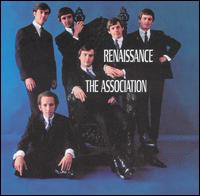 As
the 60's wore on, bands like the Association became
inevitable: they made rock music safe for squares. The Association weren't scary
like Jimi Hendrix, or weird like Bob Dylan, or degenerate like the Doors. Rather,
they reinforced old fashioned values while donning the trappings of youth culture.
And while some of the Association's more ambitious material (such as "Requiem
For The Masses") borders on laughable, their best songs (like "Windy")
are inarguable highlights of the decade - perfect, and perfectly vacuous, pop.
While another great single, "Along Comes Mary," incited debate about
alleged drug references, most of their hits, like "Never My Love" and "Cherish," plowed
a sweet, familiar, and unthreatening furrow - slow dance favorites then, now,
and forever. As
the 60's wore on, bands like the Association became
inevitable: they made rock music safe for squares. The Association weren't scary
like Jimi Hendrix, or weird like Bob Dylan, or degenerate like the Doors. Rather,
they reinforced old fashioned values while donning the trappings of youth culture.
And while some of the Association's more ambitious material (such as "Requiem
For The Masses") borders on laughable, their best songs (like "Windy")
are inarguable highlights of the decade - perfect, and perfectly vacuous, pop.
While another great single, "Along Comes Mary," incited debate about
alleged drug references, most of their hits, like "Never My Love" and "Cherish," plowed
a sweet, familiar, and unthreatening furrow - slow dance favorites then, now,
and forever.
If not for their sweeter side, the Association might have been viewed very differently
by rock historians. They were rooted in the same fertile, folk-rock soil as revered
groups like the Turtles. The Association's second single, as a matter of fact,
was an expertly rendered cover of Bob Dylan's "One Too Many Mornings." And
in their grittier moments, they resemble such sainted garage bands as the Barbarians
or the Leaves. Certainly, the Association operated in the same self-sufficient
manner as those proto-punks, largely writing and playing their own material.
Most of the time, however, the Association were the living embodiment of what's
come to be known as "sunshine pop," the arty, trippy precursor to the "soft
rock" of the 1970's.
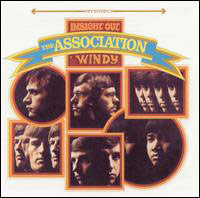 These
days, obscure 60's sunshine pop bands like the Free Design ("Kites Are
Fun") are widely acclaimed by revisionist rock writers. The Association,
however, were wildly popular in their day, and their critical reputation suffers
accordingly. As usual, the truth, lies somewhere in the middle. Inarguably,
the Association were talented, but modestly so. But, they were artistically
restless, aspiring to create something grand - something more than mere grist
for the pop mill. But, the Association succeeded - both artistically and commercially
- when they stuck to the kind of carefully-constructed, immaculately-performed
pop that ultimately reduced their hip quotient to zilch. These
days, obscure 60's sunshine pop bands like the Free Design ("Kites Are
Fun") are widely acclaimed by revisionist rock writers. The Association,
however, were wildly popular in their day, and their critical reputation suffers
accordingly. As usual, the truth, lies somewhere in the middle. Inarguably,
the Association were talented, but modestly so. But, they were artistically
restless, aspiring to create something grand - something more than mere grist
for the pop mill. But, the Association succeeded - both artistically and commercially
- when they stuck to the kind of carefully-constructed, immaculately-performed
pop that ultimately reduced their hip quotient to zilch.
Consequently, the Association provokes wildly different reactions among collectors
of 60's music. For a graphic illustration, read Bruce Eder's slobbering, laudatory biographical
essay on the All Music Guide. Then read Richie Unterberger's ironic, qualified endorsement of
the band's double-disc anthology, Just
The Right Sound (2002). Despite the fact that the Association scored five
Top 10 hits (including two #1 smashes), Eder calls them "one of the more
underrated groups" of the sixties and lays out a passionate case for the
band as unheralded pop geniuses. Then, Unterberger follows with an incisive,
4-star review of Just
The Right Sound that places the Association "closer to the Lettermen
than Brian Wilson." Ouch!
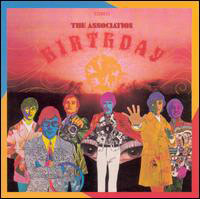 Long
before overeducated smart asses like Eder and Unterberger (and me) began kicking
the Association around cyberspace, the Association were merely a band. Founders
Terry Kirkman and Jules Alexander originally met in Hawaii, then later reconnected
in 1964 amidst the roiling Los Angeles folk scene that would soon give rise
to icons like the Byrds and the Mamas & Papas. In fact, members of both
those groups occasionally gigged with an embryonic, loosely-organized version
of the Association during hoot nights at L.A. nightclubs like the legendary
Troubadour. Long
before overeducated smart asses like Eder and Unterberger (and me) began kicking
the Association around cyberspace, the Association were merely a band. Founders
Terry Kirkman and Jules Alexander originally met in Hawaii, then later reconnected
in 1964 amidst the roiling Los Angeles folk scene that would soon give rise
to icons like the Byrds and the Mamas & Papas. In fact, members of both
those groups occasionally gigged with an embryonic, loosely-organized version
of the Association during hoot nights at L.A. nightclubs like the legendary
Troubadour.
Eventually, a stable line-up coalesced around Kirkman and Alexander, a six-man
group that also included Ted Bluechel, Brian Cole, Russ Giguere, and Jim Yester.
Yester was the kid brother of Modern Folk Quartet guitarist Jerry Yester, who
would soon produce the Association's sophomore album, Renaissance,
and later replace Zal Yanovsky in the Lovin' Spoonful. After Renaissance,
Jules Alexander quit and was replaced by former New Christy Minstrel Larry
Ramos. Giguere left before the band's penultimate LP, Stop
Your Motor (1970), opening a slot for Richard Thompson (no relation to
legendary British folkie).
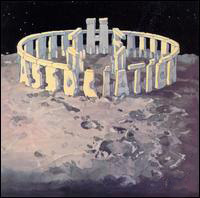 All
the Associates wrote songs and played an instrument - in fact, most of them
played several. They were accomplished singers, too, though none sang with
particular distinction. What distinguished them, then, were their accomplished
ensemble vocal arrangements. Nearly every passage was sung by more than one
voice - usually two singers in unison on the verses, swelling to polyharmonic
glory in the choruses. The end result may have been less sophisticated than,
say, Brian Wilson's arrangements for the Beach Boys, but then what isn't? The
Association may have only approached perfection when yoked behind surging pop
juggernauts like "Windy," but they were endlessly more captivating
than the lugubrious Letterman, thank you very much. All
the Associates wrote songs and played an instrument - in fact, most of them
played several. They were accomplished singers, too, though none sang with
particular distinction. What distinguished them, then, were their accomplished
ensemble vocal arrangements. Nearly every passage was sung by more than one
voice - usually two singers in unison on the verses, swelling to polyharmonic
glory in the choruses. The end result may have been less sophisticated than,
say, Brian Wilson's arrangements for the Beach Boys, but then what isn't? The
Association may have only approached perfection when yoked behind surging pop
juggernauts like "Windy," but they were endlessly more captivating
than the lugubrious Letterman, thank you very much.
That said, most of the Association's repertoire mines a shallow vein, lyrically
maudlin and musically tepid compared to stellar tracks like "Windy." Second-tier
Association hits like "Time For Living," "No Fair At All," and "Everything
That Touches You" are perfectly fine, but there's a reason why oldies
radio avoids them like the plague. Given this, the Association's Greatest
Hits - a huge success upon release in 1968 and a perennial top catalog
seller ever since - is a smart purchase for most fans despite its brevity and
lackluster sound. The aforementioned Just
The Right Sound is crisply mastered, lavishly packaged, and runs over four
times longer than its LP-era counterpart. But, it may be more than most consumers
can handle.
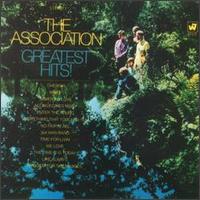 The
problem is, the broader context of Just
The Right Sound (or even Greatest
Hits) effectively dampens the impact of the band's handful of transcendent
singles. All the same, the expansive, 51-track program of Just
The Right Sound affords the listener the opportunity to dig a little deeper
- to experience not just the Association's hits but failed singles ("Yes
I Will"), album tracks ("Come On In"), and goofy experiments
(their cover of Jimmy Webb's "P.F. Sloan") overlooked by the cursory Greatest
Hits. A later compilation - The Complete Warner Bros. & Valiant Singles Collection (Now Sound, 2012) - offers much the same thing from a slightly different perspective, including both a- and b-sides of their original 45's, mostly in pristine mono. Deluxe packages like these reveal that the Association were a real band,
if not a particularly great one. Sometimes less is more, sometimes not: you
be the judge. The
problem is, the broader context of Just
The Right Sound (or even Greatest
Hits) effectively dampens the impact of the band's handful of transcendent
singles. All the same, the expansive, 51-track program of Just
The Right Sound affords the listener the opportunity to dig a little deeper
- to experience not just the Association's hits but failed singles ("Yes
I Will"), album tracks ("Come On In"), and goofy experiments
(their cover of Jimmy Webb's "P.F. Sloan") overlooked by the cursory Greatest
Hits. A later compilation - The Complete Warner Bros. & Valiant Singles Collection (Now Sound, 2012) - offers much the same thing from a slightly different perspective, including both a- and b-sides of their original 45's, mostly in pristine mono. Deluxe packages like these reveal that the Association were a real band,
if not a particularly great one. Sometimes less is more, sometimes not: you
be the judge.
Regardless , true sunshine pop fanatics will enjoy the entire Association
catalog, which has happily been reissued on CD nearly in its entirety - albeit
in fits and spurts. Certainly, their hit-laden debut platter, And
Then... Along Comes the Association, produced by sunshine pop svengali
Curt Boettcher, and the thornier follow-up, Renaissance,
are worthwhile. Both were released by Valient Records in 1966 and, despite
the relative dearth of hits on Renaissance,
the tiny label was subsequently swallowed whole by big fish Warner Brothers.
The next two Association LP's, Insight
Out and Birthday (both
produced by consummate professional Bones Howe), spawned three Top 10 hits,
setting the stage for Greatest
Hits, a #4 album that included the new track, "Six Man Band."
But, the increasingly radical chic of the late 60's was hardly copasetic with
the soft-peddled pop of the Association. The band began dialing up their pretensions
while muting their trademark vocalese. They never graced the Top 10 again.
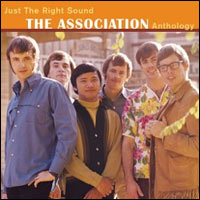 Each
of the Association's later albums holds some hidden treasures, but the band
was clearly running out of creative steam. Most interestingly, the group began
to explore a new country direction with songs like "Look At Me, Look Me" (from The
Association, 1969) - which would sound altogether at ease on a Poco album.
After Stop
Your Motor (1971), the group left Warner Brothers for Columbia, where they
recorded but one album (Waterbeds
In Trinidad!). The drug-related death of original member Brian Cole in
1972 signaled the end, though a number of odd tracks would surface over the
next decade (all documented on Just
The Right Sound). To this day, an ever-shifting cast of Association members
both old and new continues to promote the group's legacy on the oldies circuit. Each
of the Association's later albums holds some hidden treasures, but the band
was clearly running out of creative steam. Most interestingly, the group began
to explore a new country direction with songs like "Look At Me, Look Me" (from The
Association, 1969) - which would sound altogether at ease on a Poco album.
After Stop
Your Motor (1971), the group left Warner Brothers for Columbia, where they
recorded but one album (Waterbeds
In Trinidad!). The drug-related death of original member Brian Cole in
1972 signaled the end, though a number of odd tracks would surface over the
next decade (all documented on Just
The Right Sound). To this day, an ever-shifting cast of Association members
both old and new continues to promote the group's legacy on the oldies circuit.
In the wake of the pointedly tuneless grunge craze, the late 90's saw a resurgence
of interest of all things tuneful, including power pop, lounge, exotica, and
sunshine pop. Thanks to that renascence - and attendant reissues by Collector's
Choice and Rhino
Records - the Association now enjoy a higher profile than at any time
since their 60's heyday. And, revisionism aside, the Association deserve a
place in the pop pantheon. Certainly, they cannot be considered on par with
bands like the masterful Turtles or even the relatively pedestrian Grass Roots.
The point is, the Association are in the same league as those bands, and that's
some tough competition. [top of page]
 Selected Association Albums Selected Association Albums
[top of page]
 Essential Association Songs Essential Association Songs
- Along Comes Mary (1966)
-
Cherish (1966)
-
Come On In (1968)
-
Darling Be Home Soon (1972)
-
Enter The Young (1966)
-
Everything That Touches You (1968)
-
Goodbye Columbus (1969)
-
Just About The Same (1970)
-
Like Always (1968)
-
Look At Me, Look At You (1969)
-
Looking Glass (1966)
-
Names, Tags, Numbers and Labels (1973)
-
Never My Love (1967)
-
No Fair At All (1966)
-
One Too Many Mornings (1965)
-
Pandora's Golden Heebie Jeebies (1966)
-
P.F. Sloan (1970)
-
Six Man Band (1968)
-
Time For Livin' (1968)
-
Time It Is Today (1968)
-
When Love Comes To Me (1967)
-
Windy (1967)
-
Yes I Will (1969)
[top of page]
 The
Association On The Web The
Association On The Web
[top of page]
 Feedback Feedback
Your witty comments, impertinent questions, helpful suggestions, and angry denials
are altogether encouraged. Submit feedback via email;
submissions will be edited and posted at my discretion.
|
|